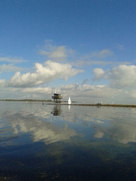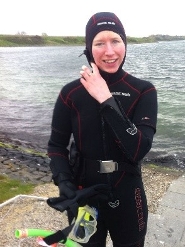Annebelle Kok
Postdoc
- Name
- Dr. A.C.M. Kok
- Telephone
- 071 5272727
- a.c.m.kok@biology.leidenuniv.nl

My research focuses on the acoustic diversity of the marine environment, how it shapes the ecology of marine animals, and how sensory pollutants can disturb the behaviour of acoustically active animals.
I completed my Bachelor’s and Master’s degree in Biology at Leiden University, after which I started a PhD under the supervision of Dr Fleur Visser and prof. Hans Slabbekoorn. During my PhD, I investigated how anthropogenic noise influences anti-predator and foraging behaviour in delphinids and fish.
After obtaining my PhD degree in 2020, I worked as a postdoc at Scripps Institution of Oceanography in La Jolla, United States. There, I used passive acoustic monitoring to study fish song, as well as the behaviour and distribution of baleen whales and delphinids. I was also part of a large collaborative project lead by NOAA and the US Navy that aimed to better understand underwater sound within marine sanctuaries. More information can be found here: https://sanctsound.ioos.us/
Between 2022 and 2024, I completed a two-year postdoc at University of Groningen, where I explored the potential of monitoring fish song in the Wadden Sea. This project resulted in a successful Veni application to study the potential for monitoring fish song as a proxy for marine biodiversity.
Currently, I work as a Veni scholar at Leiden University and a guest researcher at University of Groningen. My research focuses on the ecology and conservation of the acoustic diversity in marine environments.
Brief biography
- 2025-present: Veni scholar at Leiden University and a guest researcher at University of Groningen
- 2020-2025: PostDoc at Scripps Institute of Oceanography, USA
- 2015-2020: PhD project on the effects of anthropogenic noise on predator-prey interactions in marine communities studying marine mammals and their prey. Promotor: Prof. Carel ten Cate. Co-promotors: Dr. Hans Slabbekoorn & Dr. Fleur Visser
- 2014-2015: Freelance researcher at Fascimare
- 2010-2013: MSc Evolution, Biodiversity and Conservation at Leiden University
- 2007-2010: BSc Biology at Leiden University
Research
I am interested in the effect of abiotic disturbances on interactions within and  between species. Specifically, I would like to know how predator-prey interactions in the marine environment are affected by anthropogenic sound.
between species. Specifically, I would like to know how predator-prey interactions in the marine environment are affected by anthropogenic sound.
Sound is an important medium of signal perception and production in the marine environment. I focus on two groups of species that are sensitive to sound: marine mammals and fish. Marine mammals rely on sound for social communication and foraging purposes, but fish are sensitive to sound as well. In the past decades, anthropogenic noise has been increasing, not only in terrestrial environments, but also underwater.
 Sound may lead to changes in behaviour, such as a decrease in foraging efficiency and a decreased ability to avoid predators. I am intrigued by this phenomenon: who will benefit from this alteration in behaviour, predator or prey? And is the mechanism behind the alteration similar for foraging and anti-predator behaviour? With a combination of experiments and observational studies in the field, as well as theoretical modelling, I hope to gain more insight into this topic. Ultimately, knowledge that I obtain may be useful in predicting population-level consequences of anthropogenic sound and aid in mitigation strategies.
Sound may lead to changes in behaviour, such as a decrease in foraging efficiency and a decreased ability to avoid predators. I am intrigued by this phenomenon: who will benefit from this alteration in behaviour, predator or prey? And is the mechanism behind the alteration similar for foraging and anti-predator behaviour? With a combination of experiments and observational studies in the field, as well as theoretical modelling, I hope to gain more insight into this topic. Ultimately, knowledge that I obtain may be useful in predicting population-level consequences of anthropogenic sound and aid in mitigation strategies.
Publications
- Liew, T.S., Kok, A.C.M., Schiltuizen, M. and Urdy, S. 2014 On growth and form of irregularly coiled shell of a terrestrial snail: Plectostoma concinnum (Fulton 1901) (Mollusca: Caenogastropoda: Diplommatinidae). PeerJ 2: e383; DOI 10.7717/peerj.383
Teaching
During spring I am involved in the BSc. theoretical course and field course Behavioural Biology. Furthermore, I supervise BSc and MSc students on research projects of several months. Positions fill up quickly, but if you are interested, do not hesitate to contact me.
Postdoc
- Faculty of Science
- IBL
- Animal Sciences
The staff member publications service is not available
The staff member activities service is not available






